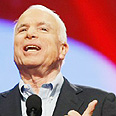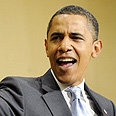
John McCain
Photo: AFP

Barack Obama
Photo: AFP
According to recent polls, President George W. Bush is one of the least liked American presidents ever. Bush has mismanaged the US economy, the New Orleans hurricane relief efforts, and the sub-prime mortgage crisis. These issues, which are of grave consequence for millions of Americans, have affected the nation's prosperity and livelihood. But these concerns will be no more than a footnote in the Bush legacy. History will judge Bush on the war he led as leader of the world's only superpower against militant Islam, or in his words, "the war on terror."
With the privilege of hindsight, it can clearly be determined that few global leaders or statesmen in the course of history were able to grasp the moment and truly address the issue of their time in the manner Winston Churchill did prior to and during Word War II. Churchill warned against appeasing the Nazis and denounced the Munich Accords of March 1938 by scorning a naïve British prime minister with the words: "You had a choice between war and humiliation. You chose humiliation and we will receive war." Yet while leading his people during the dark days of the Battle of Britain and on the various fronts abroad, he earned little recognition from his constituencies, losing their vote after the war. However, once the dust had settled and after all was said and done, the Free World knew that Churchill had led the people through their "finest hour."
US President
US president urges Republicans to rally around his chosen successor, declaring he 'understands the lessons' of September 11 attacks, including need to 'stay on the offense' against terrorists
George W. Bush is no Winston Churchill; not even close. But he grasped the moment and boldly addressed the issue of our time. Critics often tell us that Bush is a simple-minded man who sees things in terms of "black" or "white" rather than vetting through the gray. That may be true, but in the war on terrorism there is no room for ambiguities, or in the words of President Bush, "you're either for it or against it."
The perils of terrorism are the issue of our time, but its dangers and threats will not pass at once. Unlike the conventional wars of the past, terrorism is a war of true attrition that began decades ago and will probably continue for decades. This type of war is not limited to armies and regimes, but rather, is instigated by twisted perspectives of religion and militant Islamic ideologies that come in the form of ruthless Sunnis of al-Qaeda's ilk and Shiite extremists who managed to establish the first-ever Islamic Shiite Republic. The extremist Shiites and Sunnis vary in views but have a common denominator of aiming to destruct Western values. Only a policy of prevention and preemption without hesitation or remorse will eventually resolve this war with resilience rather than appeasement.
Unlike Churchill, Bush was not able to finish the job. But the continued war against terrorism must persist, and it needs to be spearheaded by the United States and its allies. Therefore, the key issue of the upcoming US elections is which candidate will better lead the war on terrorism. Will it be a candidate who opposed the war or will it be the candidate who doesn't need a campaign strategist to know that "freedom is not for free"? At the end of the day it is not a beauty contest between McCain and Obama, but rather, a question of who will better battle Osama.
The author is a partner at Naveh, Kantor, Even-Har Law firm and a research fellow at the International Counter-Terrorism Center in Herziya















